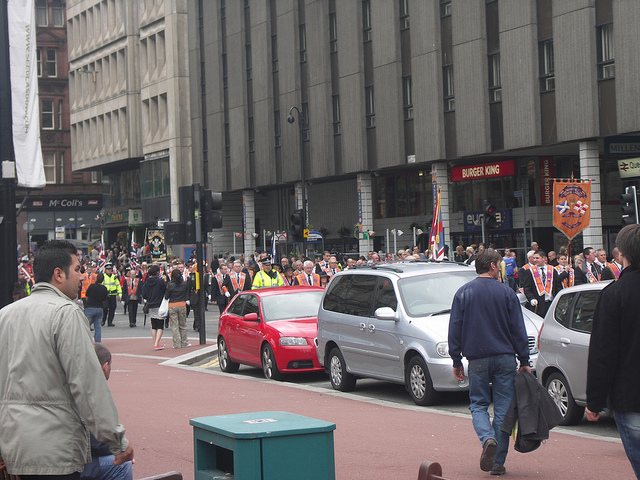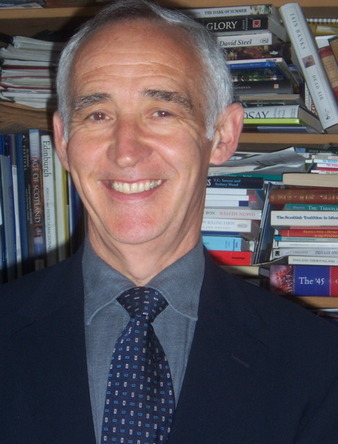Sectarianism in Scotland is about the hard politics of difference
Scotland, and particularly the West of the country, has a reputation for sectarianism, partly fuelled by the football fans of Rangers and Celtic FC in Glasgow. However, despite the widespread perception that it is a problem, most people feel that it doesn’t affect them personally. David McCrone argues that tackling sectarianism where it does exist is hard as it forces us to confront viewpoints with which we fundamentally disagree – but that the ‘hard politics of difference’ requires Scots to answer existential questions about their identity, and the kinds of people they want to become.

An Orange March in George Square, Glasgow (Credit: Martyn Jenkins, CC BY NC 2.0)
It would seem self-evident to many that Scotland suffers from religious sectarianism. After all, there is a ‘marching season’, just like Northern Ireland, and two teams Celtic and Rangers which seem to play out sectarianism on the football field. In 2012, the Scottish Government established The Advisory Group on Tackling Sectarianism, and presumably you don’t set up such a thing if it doesn’t exist.
The trouble is that the belief that sectarianism exists in Scotland is far more powerful than the ‘fact’ of its existence. Here is a personal example. I had a short article in the journal Scottish Affairs (24(3) 2015. Unbeknownst to me, the article was picked up by The Sunday Times (9th August 2015) and given the sub-head: ‘Scots urged to overcome their ‘hard-wired’ religious bigotry’. As the saying goes, never let the facts get in the way of a good story. What the newspaper had the good grace to admit in the text was that I had not said this. What I had written was that sectarianism is hard-wired into the British state, in the sense that its constitution rules out the monarch being a Catholic, and hence, there is institutionalised sectarianism at its core. So why the headline? I can only surmise (and no-one from the newspaper contacted me for comment) that it fitted the mindset and prejudices of the paper. After all, everyone knows Scotland suffers from sectarianism, don’t they?
Well, no they don’t. A bit like fear of crime, everyone knows that there is a lot of it around; not because people report that they have been personal victims of criminal behaviour. It’s something of a moral panic. This is because the media report it disproportionately in the interests of selling newspapers, and thus, while most people have little personal experience of it, ‘everybody knows’ it is a problem because the newspapers tell us so.
So what do we know? In the social survey carried out by Scottish Centre for Social Research as part of the 2014 review, almost 9 people out of 10 agreed with the statement that sectarianism is something of a problem in some parts of Scotland (notably west central Scotland, and Glasgow in particular). On the other hand, only 1 person in 8 in Glasgow thought that ‘sectarianism affects me personally’. As Michael Rosie points out ‘despite the clear perception amongst respondents that sectarianism was widespread in Glasgow, few reported specific experiences of it’.
So what is going on? It would seem ‘obvious’ that sectarianism is about religion. But whereas in 1999, 35 per cent of Scots identified with being Protestant, and 14 per cent with being Catholic, by 2013, only 18 per cent said they were Protestant, and 13 per cent Catholic. In 1999, 40 of Scots said they had no religion; by 2013, this had risen to 54 per cent. Plainly, Scotland is no longer a seriously religious country, and these figures have to do with identification with one or other religion (or none), rather than church attendance on a regular basis. There is nothing unusually Scottish about that.
On the one hand, and whether we like it or not, ‘outsiders’ associate sectarianism with ‘Scotland’, and think it’s what we are infamous for. However, ‘religion’ is no longer a determinant of what sociologists call ‘life chances’; your job or promotion prospects do not depend on which foot you kick with. There will be anecdotal evidence to the contrary, but this is an argument about broad aggregates and longer social trends. It is also the case, nevertheless, that some people experience it ‘on the street’, often quite literally, in the form of parades and their fore- and after-effects.
Sectarianism has older roots, in the 1701 Act of Settlement which meant that a Catholic could not be head of state; and here we are more than three centuries later with that still in place. The point is that the clause was originally aimed at Catholics, even though it may apply also to other religions today. The riposte might be that this is ‘history’, and we are no longer those people, but there is an institutional memory embedded in the very nature of the British state itself.
In last year’s Independence Referendum, Catholics were far more likely than Protestants to vote Yes, by 55 per cent, compared with 2:1 against on the Protestant side. This may be an artifact, because Protestants tend to be older and more middle class, and so ‘religion’ may simply be a proxy for other social factors. We cannot separate out ‘religion’ in its theological guise from the characteristics of its social practitioners. Thus, the voting habits and social attitudes of Catholics seem to have more to do with their social and historic status as outsiders in Scotland than with theological beliefs.
If we wish to change behaviours, we need to tackle the social conditions which may call them into action. If, for example, we think that a notional ‘they’ have resources which properly belong to ‘us’, be it jobs, housing, welfare, power, then it is not difficult to call into action social protest. The message for us is to treat the conditions upon which ‘difference’ may feed and fester if left unattended.
The American political philosopher, Michael Sandel, urges us to engage with what we do not believe in; to listen and respond to the counter-view, to take it seriously. It needs patience, understanding and time. This means that because we have been forced to confront deep and endemic issues like sectarianism, racism, sexism and chauvinism, we stand a reasonable chance of coming to terms with them and putting wrongs to right. This is neither easy, nor mealy-mouthed liberalism. This is hard politics, the politics of difference.
—
A longer version of this blog appears in a special issue of Scottish Affairs, vol.24, Number 3, 2015. It represents the views of the author and not those of Democratic Audit UK. Please read ourcomments policy before posting.
—
 David McCrone is Emeritus Professor of Sociology at the University of Edinburgh. His book, Understanding National Identity (with Frank Bechhofer) was published by Cambridge University Press in 2015.
David McCrone is Emeritus Professor of Sociology at the University of Edinburgh. His book, Understanding National Identity (with Frank Bechhofer) was published by Cambridge University Press in 2015.





 Democratic Audit's core funding is provided by the Joseph Rowntree Charitable Trust. Additional funding is provided by the London School of Economics.
Democratic Audit's core funding is provided by the Joseph Rowntree Charitable Trust. Additional funding is provided by the London School of Economics.
About us all … Not just Scotland. It quotes the American Philosopher Michael Sandel “engage with we do not believe…https://t.co/xpy3LblHpG
Sectarianism in Scotland is about the hard politics of difference https://t.co/ru4ZMkvCT3
Sectarianism in Scotland is about the hard politics of difference
https://t.co/8PF2nxPNJs
An interesting posting – and one I can sympatise with on a couple of levels. Firstly the manner in which The Sunday Times (ab)used your article: I had a sort of similar experience with The Daily Telegraph. The asked me to write an article based on my piece https://blogs.lse.ac.uk/politicsandpolicy/an-invitation-to-adventurism-the-fixed-term-parliaments-act-can-and-will-crucify-a-minority-government/ . I agreed and wrote an article which was printed as https://www.telegraph.co.uk/news/general-election-2015/politics-blog/11581407/How-the-Fixed-Term-Parliaments-Act-would-mean-torture-for-Ed-Miliband.html Now I wrote every word in that article – but The Telegraph cut the following paragraph which was actually central to what I wanted to say
“The alternative is for Labour to embrace the SNP as de facto Labour in Scotland, much as the Scottish Unionists were once the Conservatives in Scotland, advance a progressive economic programme and rebuild left/right politics in Britain. This is the choice now facing us – increasing disintegration or class politics. It will be said that this would upset England – wrong, it will only upset Tory England, but there is another England.”
Fair enough, it is not called the ‘Daily Torygraph’ for nothing…
On the distinction between religion as theology and religion as identity, those of us with a Northern Ireland background are fully aware that it is perfectly possible for somebody who is an atheist but from a Catholic or Protestant background to be rabidly sectarian. The conflict in N Ireland, as almost anything by John McGarry and Brendan O’Leary quickly demonstrates, has nothing to do with theology. Incidentally, what are we to make of the fact that the Act of Settlement WAS amended recently (Succession to the Crown Act 2013) in order to facilitate the succession of the first born child, as opposed to the first born MALE child – but the prohibition on a ‘Papist’ (the term used in the original Act, but, a symptom of our more enlightened times, perhaps, the term ‘Roman Catholic’ was used in the 2013 Act) succeeding to the throne remains? Interestingly, the SNP has long sought the repeal of the Act of Settlement due exactly to its sectarian nature.
Now I must go order a copy of your book…
David McCrone on Scotland’s #sectarianism as ‘the hard politics of difference’ https://t.co/YFR5Mm4oXJ
@DaveScott1977 @rosie_michael @AGMcKillop Tagging you gents as this will interest you. https://t.co/qLpBSVtfKF
Sectarianism in Scotland is about the hard politics of difference https://t.co/zPasaB8OSw https://t.co/uMJxKcNdj7